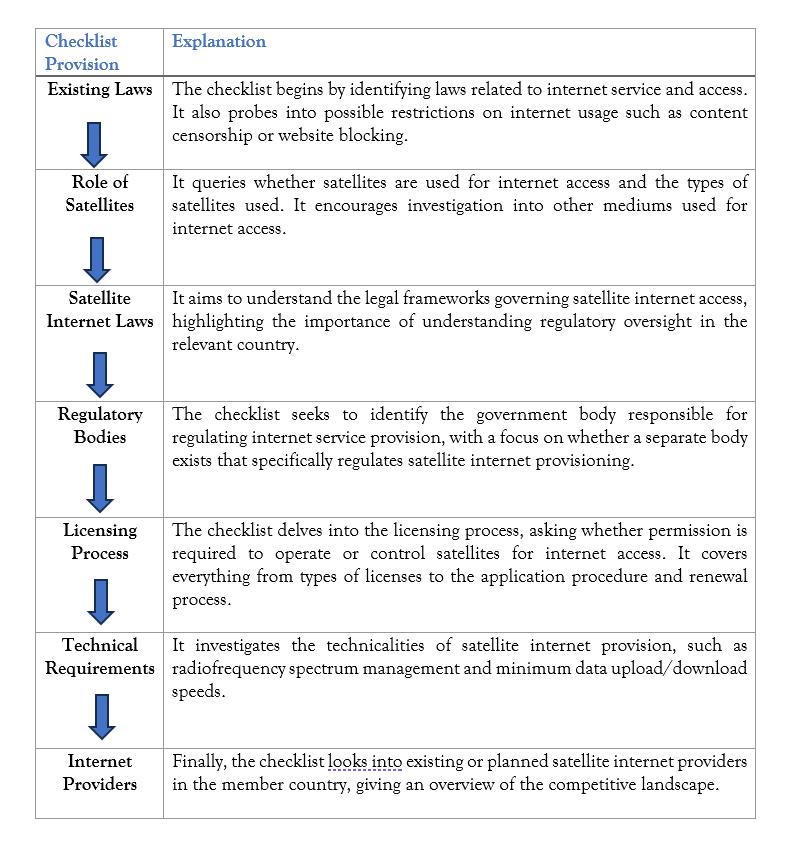Foundation Projects
FCA: Internet law research clinic 2022
Bond University, Australia
This project examined issues affecting legal frameworks related to Internet connectivity in Asia Pacific economies.
The following summary of the project comes from the Bond University blog:
In an era where socio-economic progress depends upon reliable and widely available Internet access, ensuring seamless connectivity has become essential. And for remote and underserved regions, satellite Internet is the only reliable option. Unfortunately, navigating through the complex labyrinth of legalities and licensing procedures across multiple jurisdictions can be challenging. Enter the Internet Law Research Clinic (ILRC) at Bond University, spearheading a pivotal initiative. Their solution: a comprehensive checklist poised to revolutionize satellite-driven Internet access in the Asia-Pacific. Created for the Asia Pacific Network Information Centre (APNIC) and its members, this checklist unravels the legal and licensing complexities and demystifies the rules and regulations. Digital connectivity is no longer a luxury but a lifeline, and this checklist will support providers and users on their journey towards a more connected and inclusive future.
The checklist, summarized in Table 1 below, while being generic, covers a broad range of critical aspects. It prompts users to explore key issues such as the existence of laws related to Internet service provision and access, the possible restrictions on Internet use, and the role of satellites in Internet connectivity in the relevant country. By addressing these aspects, the checklist enables users to gain a holistic understanding of the regulatory environment they operate in.
One of the major areas this checklist illuminates is the regulatory framework surrounding satellite Internet access. It helps users identify relevant legal frameworks, or lack thereof, and understand how the use of satellites for Internet access is regulated. It also guides users in identifying the responsible regulatory bodies and discerning the licensing requirements to use, operate or control satellites for Internet access.
Of note is the checklist’s emphasis on understanding the technical requirements for satellite Internet provision, such as radiofrequency spectrum management and data speed standards. This element highlights the checklist’s comprehensive nature, ensuring that users are equipped with all necessary knowledge to navigate this complex field.
The Clinic’s innovative work offers a pragmatic, adaptable tool to address the legal and technical complexities of satellite Internet access. It not only simplifies the processes for APNIC members but also contributes to the broader goal of expanding reliable Internet access across the Asia-Pacific region. Developing this checklist signifies an important step towards enabling equitable Internet access, leveraging satellite technology. It acknowledges the diverse legal landscapes across the Asia-Pacific while providing a unified, comprehensive guide for APNIC members.
While the checklist is not a substitute for legal advice, it is an invaluable starting point for anyone looking to understand the legalities and intricacies of satellite Internet provision. It therefore signifies a hopeful stride towards making the digital world more accessible and inclusive for all.

This approach was applied to create a series of fact sheets and information guides for 10 Asia Pacific economies. The Fact Sheets contain the general information about that economy, while the information guides contain the checklist questions and answers.
The information is accurate as of January 2024, however it is noted that this is a fast-moving area and the situation can rapidly change.
Fact sheets
Information guides (checklist results)
The project also contributed to various research papers. The following have been published:
Related:


